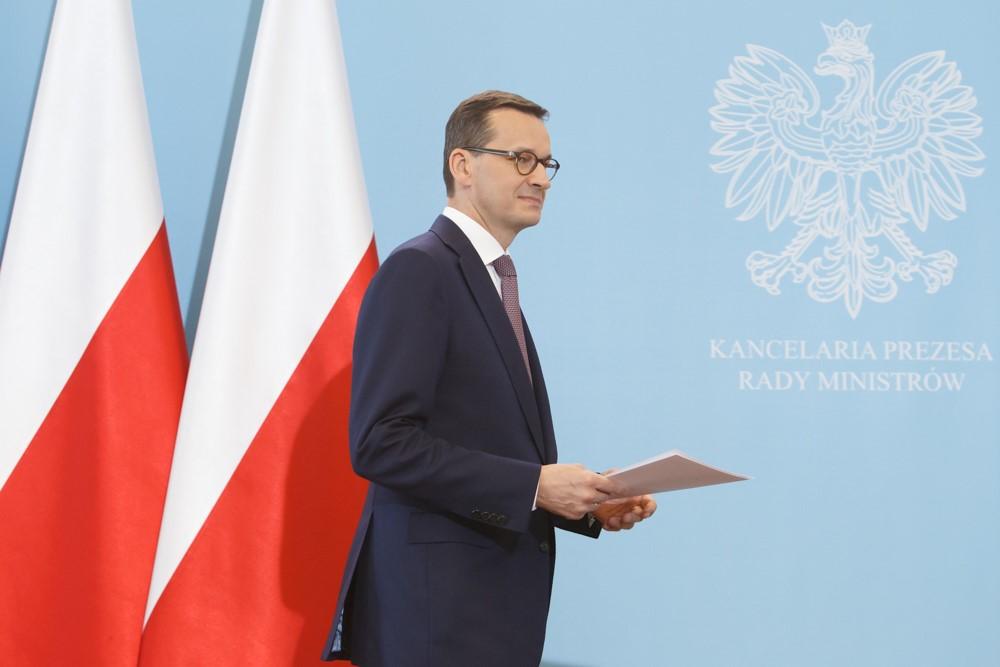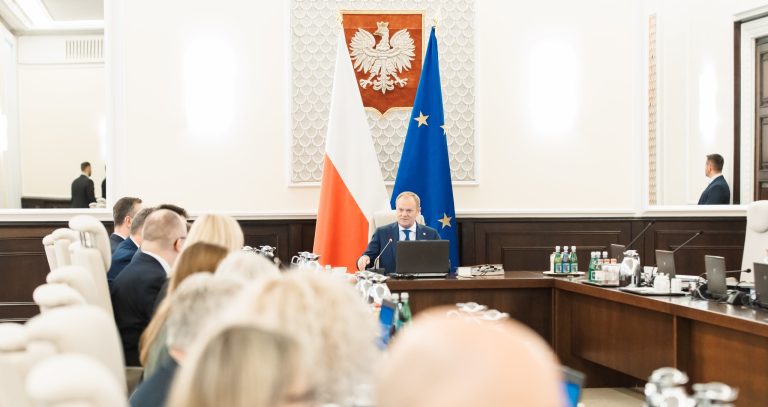Ex-PM acted constitutionally in trying to organise pandemic postal elections, rules top court

Poland’s constitutional court has ruled that former Prime Minister Mateusz Morawiecki acted in line with the constitution when trying to organise presidential elections by post during the pandemic.
The ruling relates to a highly controversial series of actions taken by the former Law and Justice (PiS) government. It has been issued by a court that is seen as being under PiS’s influence, with most judges on today’s panel being former PiS politicians.
A figure from the current ruling camp, which replaced PiS in power in December, called today’s decision “a grotesque ‘ruling’ that has no legal force”. Previously, another court ruled that Morawiecki “grossly violated” the law in ordering the postal elections.
The prime minister committed a “gross violation of the law” when ordering preparations for postal elections this year, a court has ruled.
Poland „cannot be considered a state of law if [state] organs infringe provisions of the law,” write the judges https://t.co/2wHxC1gvj4
— Notes from Poland 🇵🇱 (@notesfrompoland) September 15, 2020
The case dates back to spring 2020, when, during the first wave of the pandemic in Poland, the PiS government sought to organise that year’s presidential elections entirely by post.
They argued at the time that this was necessary due to the epidemiological situation. However, critics accused PiS of acting politically, because holding elections as quickly as possible would favour the PiS-backed incumbent Andrzej Duda, who was seeking a second term as president.
They also claimed that the manner in which the government sought to organise those elections violated various laws. Those accusations have been supported by later court rulings as well as a report by the state auditor.
Eventually, the postal elections were abandoned, despite the fact that at least tens of millions of zloty had been spent on preparing them. Normal elections took place instead, and were narrowly won by Duda in a second-round run-off.
A majority of Poles want the PM and other ministers to stand trial in relation to attempting to organise presidential elections by post last year.
Courts later ruled they had violated the law and the state auditor notified prosecutors of suspected crimes https://t.co/ZFBGhIp5Rk
— Notes from Poland 🇵🇱 (@notesfrompoland) June 7, 2021
After PiS lost its parliamentary majority in elections last year, the new ruling coalition approved the creation of a special commission to investigate the abandoned postal elections. It has since been holding hearings, including one last week involving Morawiecki himself.
Meanwhile, in December a group of PiS MPs requested that the Constitutional Tribunal (TK) rule on the constitutionality of Morawiecki’s use of an emergency Covid law to seek to organise the postal elections.
In a ruling issued today, the TK found that Morawiecki had been justified in doing so. “The prime minister, when issuing orders based on ‘anti-COVID’ regulations, had the right to believe that their scope included the organisation of elections,” wrote judge Krystyna Pawłowicz in a justification for the ruling.
“Public authorities were obliged by the provisions of the constitution to organise presidential elections in an appropriate timeframe,” added Pawłowicz. “The prime minister’s orders were primarily aimed at reducing the scale of the spread of the coronavirus…[He] interpreted the law in a pro-constitutional way.”
Sędzia TK Krystyna Pawłowicz w uzasadnieniu: premier wydając polecenia na podstawie przepisów „antycovidowych” miał prawo uważać, że ich zakres obejmuje organizację wyborów. (PAP) pic.twitter.com/JPyYNYFGK3
— PAP (@PAPinformacje) May 21, 2024
Pawłowicz served as a PiS MP until being appointed a TK judge in 2019. The head of the panel that issued today’s ruling, Stanisław Piotrowicz, was also a PiS MP until joining the TK in 2019. Another member of the panel, Bartłomiej Sochański, served as a PiS local councillor before joining the court.
The panel also contained the TK’s chief justice, Julia Przyłębska, who is a close associate of PiS chairman Jarosław Kaczyński.
The current ruling coalition has argued that the TK is no longer a legitimate body because it contains two judges who were unlawfully appointed under PiS and because Przyłębska has remained as chief justice despite her term ending. They also say that Pawłowicz and Piotrowicz have a conflict of interest in cases involving PiS.
As such, the government has simply chosen to ignore certain TK rulings, arguing that they have no validity.
In response to today’s ruling, Dariusz Joński, an MP from the ruling coalition and the head of the parliamentary commission investigating the postal elections, called it “a grotesque ‘ruling’ that is not binding on anyone and has no legal force”.
Groteskowe „orzeczenie” nie jest dla nikogo wiążące i nie ma żadnej mocy prawnej. To tylko publicystyka nominatów Kaczyńskiego. pic.twitter.com/3tR4Bw4ULO
— Dariusz Joński (@Dariusz_Jonski) May 21, 2024
Adam Bodnar, who is justice minister and prosecutor general in the current government, argued that the TK should not even rule on the case because it is not allowed to assess issues relating to laws that are no longer in force, which is the case with the Covid law in question.
PiS, however, argued that, despite not being in force, the Covid law still has legal effects and the prime minister’s decision stemming from it may be subject to further court proceedings, reports the Gazeta Wyborcza daily.
In September 2020, Morawiecki was found by Warsaw’s provincial administrative court to have committed a “gross violation of the law” in ordering preparations for the postal elections. He had appealed against that ruling but the appeal is yet to be heard, reports news website Wirtualna Polska.
Notes from Poland is run by a small editorial team and published by an independent, non-profit foundation that is funded through donations from our readers. We cannot do what we do without your support.
Main image credit: KPRM (under CC BY-NC-ND 3.0 PL)

Daniel Tilles is editor-in-chief of Notes from Poland. He has written on Polish affairs for a wide range of publications, including Foreign Policy, POLITICO Europe, EUobserver and Dziennik Gazeta Prawna.






